Hello all. I had a different post planned for today, but late last night, this one arrived instead, which feels more timely, landing what felt softly but generously within me. In writing it, I felt expanded. It was reminding me of where it might be wise right now to direct my attention. In the spirit of narrative amplification and ‘turning towards’ which I write about here, I am not putting this behind a paywall. I hope you find some value here. Thank you. Clare.
(For those listening, Milly, my dog makes a cameo appearance. It’s clearly time for walkies)
The photos in this post were taken this morning, as the sun did its glorious thing.
All week the blackthorn have been bursting into bloom. Confetti white plumage on branches break the West Cork shoreline into celebration. Among the blooms, a blackbird forages for twigs, his furtive orange beak an emblem of determination and drive: it is time to build.
All week too a short phase has been turning in my head, as if re-directing me to the source of my own drive. It’s from the writer and philosopher, the late John Moriarty. He is speaking about what it means to be in right relationship to the ground of our own being, and primarily to the world around us; to the blossom, the bees, the river bed, the ground itself.
To be is to be towards.
It is a simple phase, which holds multitudes. I turn it around in my head again, wading into cold water, as the Atlantic takes me in on this crisp Spring morning. To be is to be towards.
To Moriarty, a man of soul and soil, to be towards was to be facing sacred or holy ground, not in an ecclesiastical sense, something vaulted or religious, but the divine ground of the earth, the holy ground of stone and branch, river and salmon, bird and bloom. To be towards this ground, was, in his mind, also an orientation towards the sacred in ourselves. It was an ordination too, in recognising the indigenousity of each human’s interconnectedness with the earth, inextricably linked. We are part of this ground as much as inhabitants on it; we are made of and by this earth; I am only I, because of the blackbird and the blackthorn; I am because of the billions of tiny organisms which make them too. We each are a multitude.
In an age of platitudes and narratives which drive fear and the boxing of people into stereotypes, it is to writers like Moriarty I find myself turning. As if a bee foraging with the help the magnetic north, I turn towards these voices to forage on their wisdom. I am there for their voicing of the irrefutable truth of our interlinked existence; for their insistence on wider views, for their recognition of the sanctity of every blade of grass. I am there too for the myth and the mysteries, held in the way a salmon will return to source, or the telling of the old tales, which had yet not lost grip on this knowing of our interconnectedness; stories so masterfully recounted in the likes of Moriarty.
Isolationism, tactics of one-upmanship and the constant hammer of cultural tropes fail in their essence to turn towards this ground of recognition, yet beyond the economics of fluctuating global trade markets or the politics of boarders, there still remains this: we are only because we are. The air I breathe in, was once tree or ocean, maybe in Ireland, or Pakistan, or Palestine. Atoms and molecules circling for billions of years.The air you breathe in, may once have been me. The liquids of your being may be an ancient river, thought extinct, but now running through your veins. You might be part Rwandan, part Haitian, part swamp, part navigational bee, bound too to the magnetic forces beyond your own awareness. We are so much older than we think we are. We are so much more than we have ever been told. To be towards holds the memory of earth’s ancientness. To be towards, threads, with Yeats’ footing too, that is: softly.
So it is to writers, and artists and educators I am turning towards for solidarity and navigation: those who are part of amplifying a narrative which holds the potential for bending the arc of history not just towards justice, but to the remembrance of this sacred ground. This kind of deep remembrance is not a faint or quaint nod to the past; it is a living, breathing, acting kind of remembrance, which gets to live out in our politics and institutions, in our economic systems and trade markets, in our playgrounds and in our futures.
I turn towards the writers, like Robert Macfarlane, whose prose and eloquence, rooted in investigative curiosity, generous tutelage, and the fine lineage of nature writing, expands my world view, above and below ground. He will be turning it towards rivers soon, with his new book touching into the Rights of Nature movement, ‘Is a River Alive?’. I’ll track it closely.
I turn towards Elif Shafaf, an honorary spokesperson for the power of story, in all its multiplicities and diversifications, who amplifies the voices on the margins.
I turn to Chimamanda Ngozi Adichi, who long ago spoke about The Danger of a Single Story and continues to echo that warning through her complex narratives of Africa and the African diaspora which rallies so beautifully and so necessarily resistant to the shallow profiling not just race, but of feminism and of the range of human experience as a whole.
I turn to Robin Wall Kimmerer, whose whole being is bent towards that holy ground, weaving indigenous wisdom through the often colonialist mindset which too readily tempered the scientific.
I turn to voices like Jeanette Winterson and Jay Griffiths who frankly cut through the bullshit yet still remind us of the light.
I turn to Ocean Vuong, who speaks to holding history in a wider lens, opening apertures on migration, homophobia, war, nationalism, and all with language which outdoes its own capacity as language, traversing into poetry and the poetic as a device of the soul as much as the imagination.
I turn to Samantha Harvey, of Orbital, who has offered us a perspective, quite literally to rise above.
I turn toward the poets, too many to name in their totality, but right now, there is Naomi Shihab Nye, Joy Harjo, Linda Hogan, Paula Meehan, Doireann Ni Griofa; poets who hold indigenous perspectives, the voices of the persecuted, the voices of the myths, the voices which are in fear of voicing themselves.
I turn to publications, places like Emergence Magazine, Resurgence, Dark Mountain, Orion; each a constellation of others, turning towards.
And I turn towards the educators, doing the long, slow, often hidden work of building minds, hearts, imaginations and wonder; helping those who will still stand on this ground with the skills to stand hopefully a little more lightly too.
In truth, everywhere I turn, I see: towards. I see the protesters, standing up. And the journalists, speaking out. And the rights of nature lawyers. And the scientists. And the environmental defenders. And the human rights defenders. And the filmmakers. And the storytellers. So many, too many, are risking their lives to do it. Yet still they turn.
And above all, I am turning to the blackbird and the blackthorn, to the blossoming branch and its invisible root. I am turning to the spider’s web housed in there, and the spider too, building its home. I am turning to the fungal networks, whose names I may never know, holding it all together. Then beyond the bank of blossom, I am turning towards the waves, each one coming, as each one is leaving, inextricably tied to the moon beyond, always in motion, turning towards this holy ground, like it has been doing ever since I was at least a river, or maybe just drop in an once very frozen sea. It’s amazing where we have come from. It’s amazing what we might still be.
Now over to you.
Who or what are you turning towards? Feel free to leave a comment in the post.
Coming up on The Wild Edge later this week:
Thursday 10th April, 8-9pm Irish/UK time - Owl Hour: An hour of creative practice, in circle.
Sunday 13th April, 6-7pm Irish/ UK time - Poetry Salon: An hour of connecting to the spirit and possibilities of poetry.






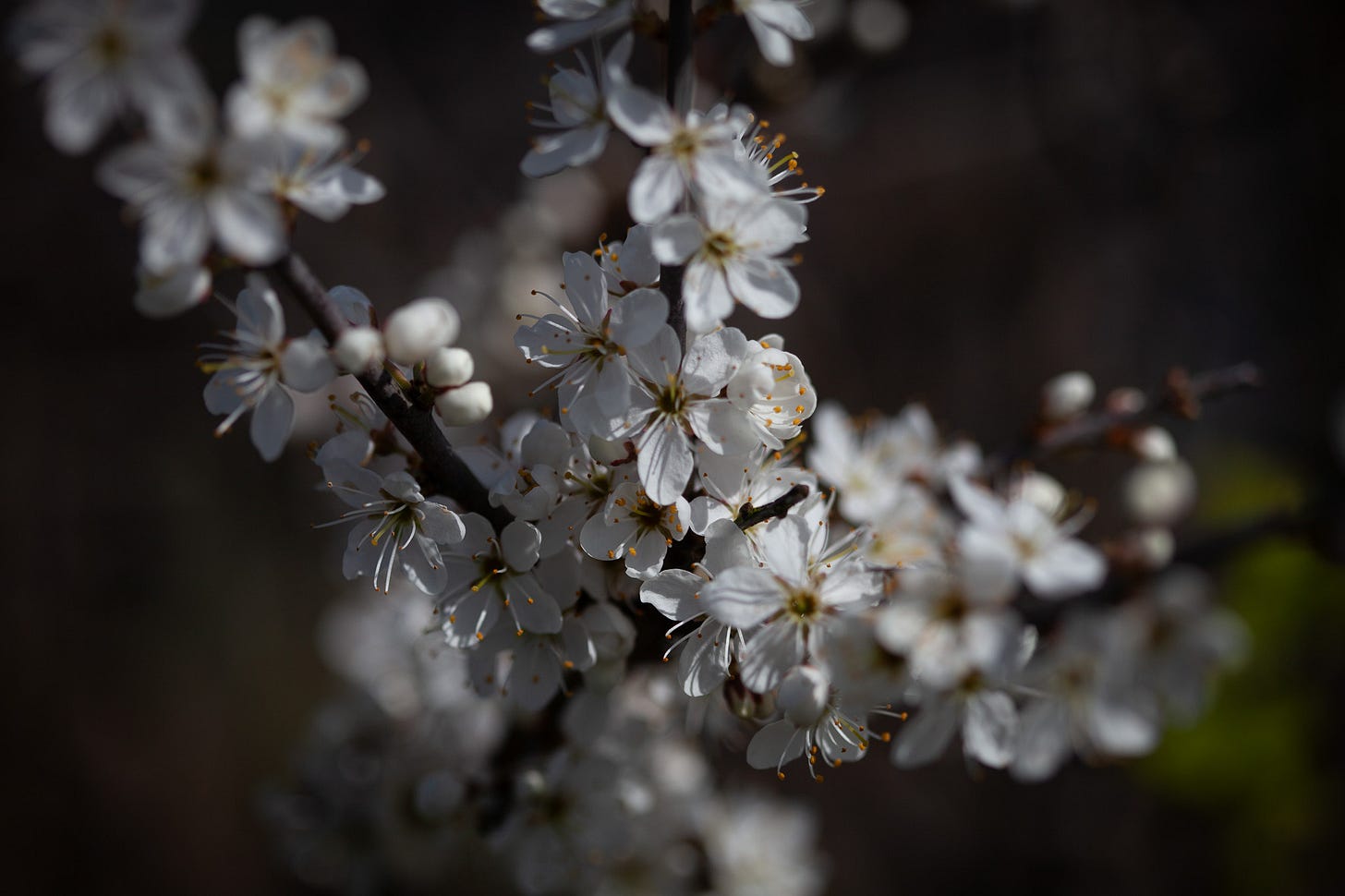
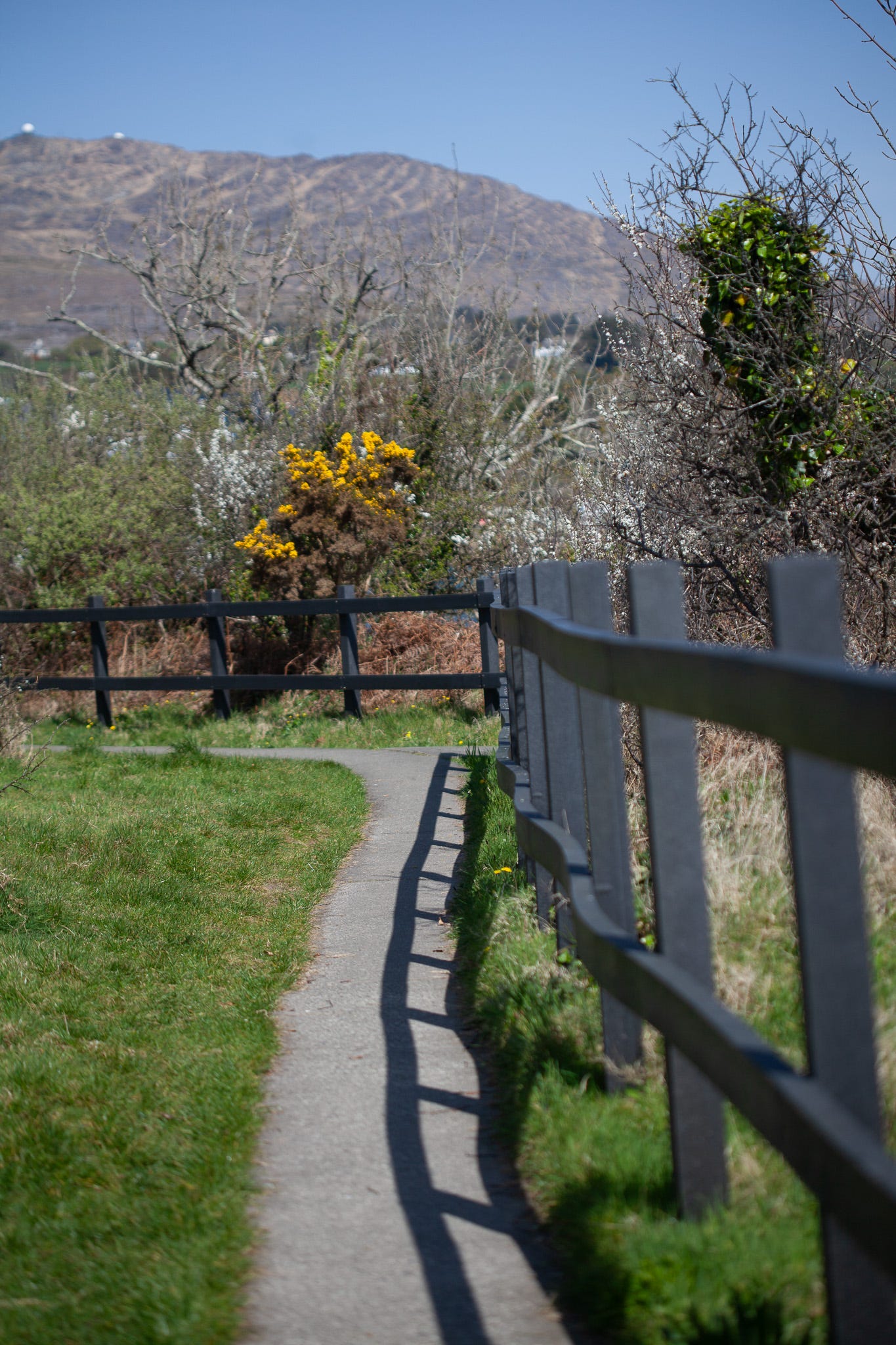

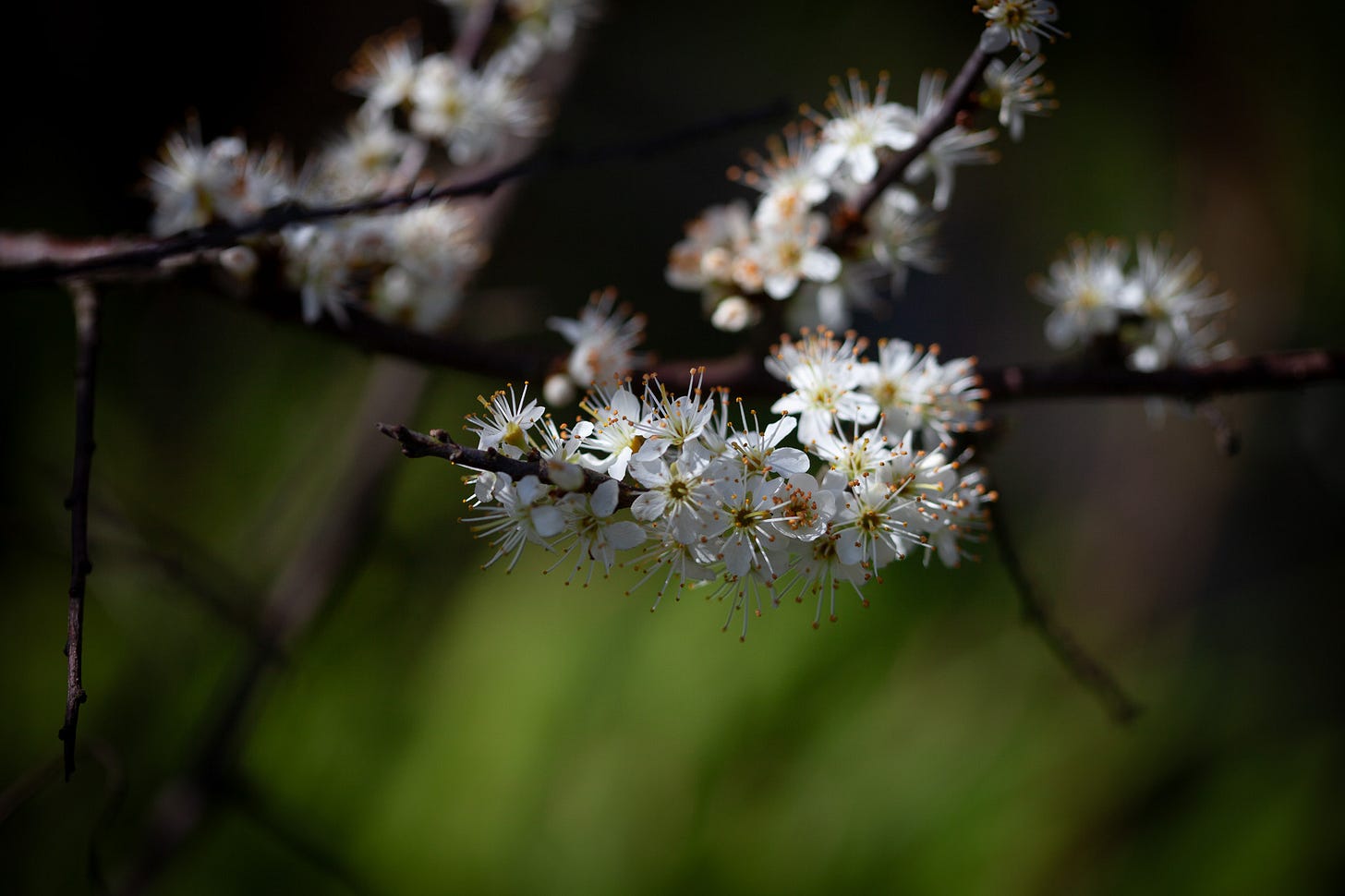


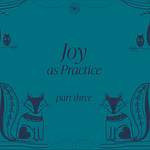
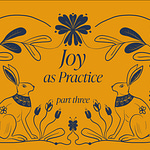
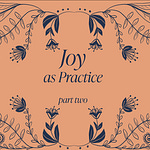





Share this post